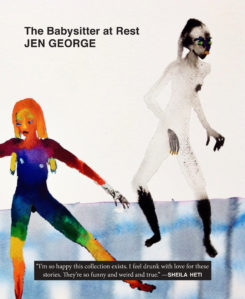 [Dorothy; 2016]
[Dorothy; 2016]
My memory is mostly gone, though not entirely.
—Jen George, The Babysitter at Rest
When Jen George speaks of memory in “The Babysitter at Rest,” the title story in her debut collection, she establishes the mechanisms of episodic memory as broken tour guides for all five of these bizarre and deeply funny stories, as most reviewers seem to agree, although it’s possible that funny is, altogether, the wrong term, and it’s likely that this inadequacy comes from our not having a shorthand way to say funny in the same tender place where I feel indigestion, and funny through a low, dark seethe. We sometimes seem to not be properly equipped to separate what’s absurd (because it’s aggressively aware) from a joke — too often, they swap spots — and George’s sense of humor is most directly evidenced by the absurdity of her protagonists, who are women — more specifically, the aware sort:
I was sexually attractive, which is highly valued in college and art circles, as well as other hierarchal scenes mimicking the structure of capitalism wherein older men with large hands finger younger women who read novels and possibly write or paint or play an instrument . . .
Artists, attempting professionals, and students: George’s characters are all predicated on the images one may have on file of the modern adult woman, images that accrete over time, and in that process of building out memory, debris settles, images obscure, and the clearest way to re-see — to use this book’s logic—is to view the modern woman in abstraction.
Reality is humor’s original source. We laugh in recognition or collusion. We laugh when we’re somehow written into the joke: we’ve seen the joke’s face or maybe those faces are ours. There’s an identification process. The joke relies on collective memory. It relies on those changeable rules which govern what’s in the fabric of acceptability. But regardless of the joke’s manifold constructions, across demographics and cultures, the majority of jokes do share at least one thing in common: their objective is to have you get it.
Recently, my friend Laura and I accidentally began #XtremeWalking. Laura’s parents had new Fitbits and became avid step counters. Laura’s mother left their family in a line for theater tickets so she could circle the block once more; she wanted to beat Laura’s dad’s steps-per-day tally. Her parents become competitive: They march in place and excuse themselves for a lap around this or that building, this or that parking lot. Lying on Laura’s bed, laughing at the absurdity of a Fitbit, her parents felt so much like parents. The conversation was a joke; however, as the weekend and the joke continued, something shifted and we started walking and counting.
Within the course of one day, a transition was made — joke to reality — the jump nearly imperceptible. We spent the better parts of our days walking between Manhattan and Brooklyn, sending screenshots of our walk maps. The joke isn’t linear. It circles: we make the joke; we get and remember the joke; we are the joke.
In this collection’s first story, “Guidance/The Party,” a woman receives a genderless guru for her life, which will be tested in the cumulative action of one night of party-hosting. “‘Smile and look busy in conversation,’ The Guide says, giving an example of a pleasant smile. Their teeth are a blinding white; the brightness causes me to squint.” Divided into sections like “Excuses”; “Stretches & such”; “Wishful thinking,” this story is delivered as manual, which feels integral to the scattered logic, to its moving parts of character and situation. It’s prosaic enough, hosting a dinner, but it’s the George gesture to write this action as a shade or three off — aware of itself, herself — and this abstraction marks the space where we might find the circling joke.
When I speak of the George gesture, I speak of her ability to make the ordinary ludicrous; the details of the host’s party read as material for an anxiety dream: there’s the challenge (a party), an audience to bear witness (humorless guests, mostly pregnant), and an insuperable obstacle (the need for recognition). Our host often wants to know if she’s doing it right, transitioning into a sufficient adult or relevant form of whatever her urban environment beckons.
When I search for adulting on Twitter, so many agree with our host. They say it’s hard. Ugh, so much adulting. They have modest adulting successes — they clean their houses, wear suits, use day planners, and afterward they want to drink a lot or watch TV. Childhood punishments of abstention have become adulting goals. It would be cool if as soon as you say “adulting” you were blasted off into space from wherever you are. They are tired, they say. Our host is also increasingly harried, except these aren’t antics; this is what happens before an irrevocable break. This is an adulting attempt as salvation. What ails the host is as familiar as the concepts of loneliness and aging, but when she wears it, it’s horrifying and completely illogical that it should also happen here.
‘But I thought I could maintain certain things,’ I tell The Guide in a moment of naive trust and vulnerability. ‘Like the belief that my experience is leading somewhere? Except I didn’t know it was belief when I was young?’
Here, and elsewhere, George employs the adulting list to dizzying effect:
While The Guide sleeps, I clean the house; make 10,001-ingredient mole with seventy-two hour prep time (secret ingredients: smoked gold leaf and albino peacock talon paste); bake an eight-tiered cake; hand paint ceramic serving platters with Mexican-style floral design; wear a castor oil wrap; do squats; give myself an enema . . .
The list can lull, confuse, exalt, or grate; however, George’s lists are pitiless. And it’s the sheer volume of impossible expectations that brings us to this story’s question: Can the host get inside of this modern woman model and live up to a line of gendered social expectations? The modern woman, I’m reminded, can do everything — art star career, babies, parties — and everyone, it seems, is willing to let her. And that’s sort of the gist in this collection: There is a pre-existing model and it’s yet to be determined what exactly the conditions of joining are, although we know well if we’re in or we’re out, and here’s the final kicker: if you don’t learn the unspoken rules, and you don’t master them on time, you likely never will.
The Babysitter at Rest makes discrete shifts and turns through its protagonists, who seem to be unified by a particular art-school-brand of dialogue with the world: I Learn, I Act, I Create, The Aesthetic Class Responds. Repeat. While reading I often wondered if I was contending with the same character in each story. It seemed to be the same morass of the modern yearn for self actualization. Or could it be that we’re at least shaking the same weighted family tree?
The tree, if interpreted liberally, could be closer to what is being built here: a five-story accretion toward some larger whole that I would describe as The Stirring Superficial. It may only be a small dinner party — the small parcel of inconsequential landscape that belongs to the feminine, according to gendered social expectations — but what’s at stake here is much more than a 10,001-ingredient mole. It’s the existential dilemma of attempting to bridge the irreconcilable desires of retaining what is vibrant while growing toward what is firm and complete, or adulting.
The collection wants for a comparison because these stories do seem to have a postmodern lineage: ironic, vertiginous, a deconstruction of the highly codified social systems supporting art school ← → art world. The work has been compared to Kathy Acker, which I can agree with, but only on the condition that it’s qualified by noting the distinct differences between the two, the most notable of which is Distance. Where Acker knows no bounds, George uses restraint to distill an image, state of mind, a position of misgiving. Where In Memoriam to Identity can turn out a reader by its dislocation, The Babysitter at Rest is specific in its positioning.
In the frenetic penultimate story, “Futures of Child Rearing,” a woman trying to get pregnant considers all of the ways this process could go horribly wrong, in addition to all of the ways she could possibly beat the system of inheritance. A notion which deludes many of us: We think we can, at any time, give only what is good, and that it is good that is mostly in us — but it isn’t true. This woman sticks her finger in an ovulation machine, which tells her: Transaction Declined. “I’d like to have a baby,” she tells us, “but I fear I’ll resent all the compliments he’d get.” She sticks quail eggs in her vagina; she visits a crystal store and spends six hundred dollars on a piece of star sapphire; she buys a drum of fish oil capsules. The position is clear: This protagonist wants an award for Best Baby, and somewhere in this world such an award must exist. And yet: “I put my hand in the ovulation machine: This is torture, it says on the screen.”
While #XtremeWalking somewhere near South Williamsburg, I came upon two firemen shoving a thin metal rod into the door of an SUV. A woman puddled near their feet on the sidewalk was screaming, her hands covering her open mouth. Another older woman, huddled over her push cart, walked by me and said, “Shameful.”
I asked if she knew what happened.
“She locked the baby in the car.” Heat was radiating from the blacktop; we were all barely clothed.
“Me? No crying,” she said. “I would’ve broken every window on that car. But look at her.” As if on cue, the woman wailed.
“How do you lock a baby in a car? Get tough. Break the windows. Don’t sit there and cry.” She mumbled and kept walking. “How can you be so stupid?”
It would be crass to say that adulting is defined by not locking your keys in your car when your baby is in it. Because adulting is ultimately a hashtagged joke, and hands-over-stricken-face — This is torture — is an image too clear.
George takes us close to the absurdism of Donald Barthelme, but also the blurred distinctions between realism and science fiction that can be found in the work of Doris Lessing, a kinship found in spirit, not style, and is best defined by their senses of humor. In discussing her book, The Good Terrorist (about an impressionable woman named Alice who becomes a radical terrorist in London), Lessing surprisingly describes the work as humorous. “Well, it is comic, in a certain way,” she told The Paris Review. “We always talk about things as if they are happening in the way they’re supposed to happen, and everything is very efficient. In actual fact, one’s experience about anything at all is that it’s a complete balls-up. I mean everything!” To try again: Where Acker is concerned with the destruction of certain concepts and ideas, George is concerned with an act of de-creating our elaborate becoming rituals, the anti-bildungsroman one could say, and showing it for what it is: “balls-up,” as Lessing does with a character like Alice, who couldn’t eat anything that once walked, but doesn’t flinch at the idea of detonating a bomb to kill hundreds.
In the story “The Babysitter at Rest,” this process of de-creation is most visible. We’re dropped into a place, a neighborhood or town, which could or could not be ours, or it’s a reality resting directly below our own: the abstracted reality. Once again, the narrator doesn’t have a name; instead, she has an occupation and a few simple desires. The babysitter, in this case, works in an office, where she ranks low, until she’s fired. She watches Tyler Burnett and his wife’s baby, painting in her spare time, “little things—ideas of a sunset, a bird—that I sell for ten to fifteen dollars apiece to people who also work jobs and live in houses, possibly with families. Here quality does not matter.” The Babysitter mechanically recounts the events of her life as they pass her. She does not know how old she is, and it’s not clear that she cares so long as she’s still somewhat young, so she continues to dress and behave like a young girl, which Tyler Burnett — of course, she’s fucking him — demands:
“Child, please don’t pursue obscure aspirations of becoming something, though I know you wouldn’t know how to even if you wanted. It’d spoil you. You are better the way you are.” Tyler Burnett tells me before I leave for the night.
His baby, whom she’s watching, will also not grow older. He’s been a baby for years and this is mostly treated as an everyday fact, but then there’s a moment of incisive clarity — as George often judiciously includes — where the observations of a character catalyze meaning for the reader. Tyler Burnett’s wife tells the babysitter:
“The whole point is for your child to transcend what came before him with the benefit of your experience. But when you know there will be no adult form of the baby, it changes the relationship.”
The soup of home, labor, and the rest can’t be separated in this space. Tyler Burnett buys her ice cream cones before pulling out his penis and saying, “Child, I would like you to suck my dick.” Or: “Child, I would like to titty-fuck you.” However, again, our protagonist shows that she’s, at least to some degree, in on this, too — is it ever a joke, or is it always a joke — after Tyler Burnett buys her a stuffed pony: “At times I forget if we’re lovers or if he’s my father. He does not feel like a father.” Roland Barthes used the term “reality effects” for the little moments of incident in the background or margins of a picture that bolster its truth value.
The babysitter’s roommates accidentally kill another roommate by sealing her into the pool; “Lizzie Olsen shoots people with nail bullets from her wooden gun while her parents snort ketamine on the banquet table”; artists come to dinner at the Burnett’s and light the table on fire after throwing their plates off a cliff into the ocean.
We’re in on the absurdity of this, and we could call it funny, a funny joke, but for that to be true, we have to make sure we’re listening to a joke in the first place, because not all absurd statements are meant to be humorous ones, and the way for a joke to exist is for everyone in the room to agree this is what’s being proffered. But then, perhaps, your room contains the dissenter, the voice that throws a speed bump into the joke: they interrupt, they’ve already heard this one, they don’t possess the cultural reference points to get the joke’s trajectory, they take the sarcasm too literally. They don’t think that one can get a crate or a barrel at Crate & Barrel. It requires several steps back in order to see the difference between what we learn from the world and what is innate, or to see an object anew, or maybe to see the hysterical heartbreak in the reality and joke being one in the same.
Chelsea Hogue writes and teaches in Western Massachusetts. Her fiction and nonfiction have been published in The White Review, The Collagist, Quarterly West, and Autre Mag, among others.
This post may contain affiliate links.







